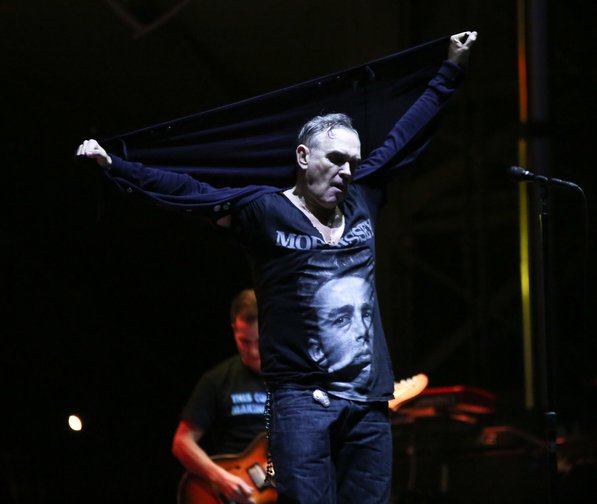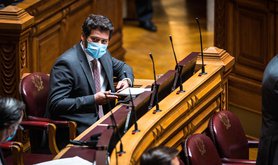
Cancel Morrissey? – controversy over music and free speech
These controversies persist because Morrissey has been able to continue to make statements in interviews, and to publicise even more on his website.

On the iconic Pyramid Stage at Glastonbury Festival this year, The Killer’s lead singer Brandon Flowers was joined by The Smiths Johnny Marr for a rendition of ‘This Charming Man.’ In a review, a music critic with NME noted that Flowers almost looked to be ‘auditioning to be the new Morrissey. Because we could do with one.’ This reference was to the ongoing drama surrounding former Smiths frontman Steven Patrick Morrissey and his politics. Questions surrounding Morrissey’s relationship to the British far-right and his artistic legacy are not just for music-lovers, though. They tap into broader philosophical debates about the intersection of fandom, free speech, and far-right thinking.
A controversial figure since the mid-1980s, accusations of Morrissey’s ties to the far-right have developed in recent years in various statements. Although Morrissey has denied accusations of ‘racism’ and ‘fascism,’ many of his comments appear infused with far-right tropes about Islam and immigration. For example, the singer has connected the Manchester Arena bombing to Theresa May’s immigration policies, claimed ‘halal slaughter requires certification that can only be given by supporters of ISIS,’ and characterized silence on halal slaughter practices as occurring because ‘It is exclusively popular with Islamists, and both Labour and the Conservatives desperately want the Islam vote… Migrant boats mean migrant votes, and so on.’ He has also spoken about the destruction of the ‘British heritage’ and how Labour and Conservative politicians ‘do not object to FGM [female genital mutilation], halal slaughter, child marriage, and so on.’
Morrissey has said ‘London is second only to Bangladesh for acid attacks. All of the attacks are non-white, and so they cannot be truthfully addressed by the British government or the Met Police or the BBC because of political correctness’ and declared the term ‘racist’ to be ‘meaningless,’ arguing that ‘Everyone ultimately prefers their own race… does this make everyone racist?’
For Britain
In a 2018 interview, Morrissey declared that far-right For Britain party leader Anne Marie Waters ‘believes in British heritage, freedom of speech, and she wants everyone in the UK to live under the same law. I find this compelling, now, because it’s very obvious that Labour or the Tories do not believe in free speech…I mean, look at the shocking treatment of Tommy Robinson.’ In May of this year, he twice appeared wearing a For Britain badge—once during an appearance relating to his Broadway residency, and again on an American talk-show.
For Britain argues that the influence of Islam ‘is directly responsible for unimaginable cruelty to women, to atheists or apostates, to children, and to animals,’ and decries how ‘Islamic values’ are increasingly prevalent in Britain. Its manifesto likewise discusses the ‘displacement of the native British’ and has stated ‘mass immigration has resulted in a fractured and divided Britain, where the native population is insulted and degraded.’ An investigation by the advocacy group Hope not Hate, meanwhile, has found that a candidate from For Britain had ties to National Action and far-right organisation Generation Identity. At their 2018 conference, the group even invited Ingrid Calqvist, a writer who has been accused of Holocaust denial, and Robert Spencer, a writer whose work is classified as Islamophobic, to speak.
Beyond merely stating his interest in For Britain, Morrissey is having a material impact on the party. The For Britain website, for example, has a page dedicated to his support. ‘We’ve had another clear endorsement from Morrissey!,’ it boasts, before encouraging readers to join the party and to donate, and to purchase party merchandise. In a recent video, meanwhile, Waters repeatedly asserted that Morrissey supported For Britain, and has thanked him for wearing their pin: ‘I can tell you that the traffic to our website exploded with the story breaking of you wearing the For Britain button badge… We have sold out of those… they are selling like hot cakes.’
Conflicted individuals
Controversial for many, for others, the question of Morrissey’s political opinions and actions are a non-issue in the context of his status as a performer. Nick Cave, a prominent musician, published a response to the controversy that has been praised. ‘[Musicians’] views and behaviour are separate issues,’ Cave said. Arguing for freedom of self-expression, he concluded: ‘Perhaps it is better to simply let Morrissey have his views, challenge them when and wherever possible, but allow his music to live on, bearing in mind we are all conflicted individuals – messy, flawed and prone to lunacies.’
The Spectator (USA), meanwhile, classifies Morrissey’s wearing of the For Britain pin as part and parcel of a ‘provocateur’ persona, and the uproar as indicative of the repression of free speech. Another article, linked on Morrissey’s website, claims that there is an organised effort to tarnish Morrissey’s name and asks ‘If some of the public do not agree with Morrissey’s political beliefs, that is one thing, but are we really so uncomfortable with being provoked into thinking? Are we against even having the debate? So much so that we would rather silence or harass alternative voices?’ Morrissey is considered as engaging in a ‘fight for free speech.’
These characterisations of Morrissey’s political profession as part of his provocative performativity or accusations that there is a targeted campaign against the singer, however, ultimately miss the mark. Tensions over the role of personal politics and artistic personae are neither unique to Morrissey nor new. Artists have, for years, been held to account in various ways for the statements they make. Take Eric Clapton’s incendiary commentary on race that helped to galvanise Rock Against Racism, or Sinead O’Connor’s ripping up a picture of the Pope on live television, for example. Both experienced some ostracism for these positions. Thanks to #MeToo and revelations about sexism and racism in the entertainment industry, meanwhile, art-lovers, cinephiles, and television lovers have been contending with the question of if/how to consume pieces of art linked to those accused of discriminatory behaviour or serious, (at-times criminal) misconduct. In short, consumers are constantly asked to make decisions about what they are willing to accept from those they want to entertain them.
Conscious choice
Moreover, others view the Morrissey controversies as timely in light of recent narratives about a ‘cancel culture.’ On various social media platforms, users have repeatedly classified the former Smiths frontman as ‘cancelled’ for his views; to his defenders, this amounts to restricting his right to free speech. However, this underestimates the singer’s involvement. These controversies persist because Morrissey has been able to continue to make such statements in interviews, and to publicise even more on his website. Morrissey’s responses to criticism of his opinions, meanwhile, show that he not uninformed when it comes to discussions of their use by far-right parties. That he continues to make such statements and praise a far-right party is not a matter of ignorance, but rather a conscious choice to continuously publicise these ideas. Morrissey’s fame also means that such statements are given particular amplification and are being listened to. Hence the thanks elicited from Waters.
Some claim that the controversies surrounding Morrissey should alert us to the imminent prospect of an overly-sensitive ‘PC’ culture, repressive in its unwillingness to let unpopular opinions be heard. However, the truth is that Morrissey continues to get a hearing. His enduring popularity despite his statements, rather, should continue to evoke in us a series fundamental, personal questions:. Can we divorce the art from the artist? What happens if we do, and what happens if we don’t? People will inevitably answer these questions differently. As societies are experiencing a rise in far-right thinking and violence, though, Morrissey may find some audiences less willing to march to the beat of his drum.
Visit the Centre for Analysis of the Radical Right (#CARR)
Read more
Get our weekly email





Comments
We encourage anyone to comment, please consult the oD commenting guidelines if you have any questions.